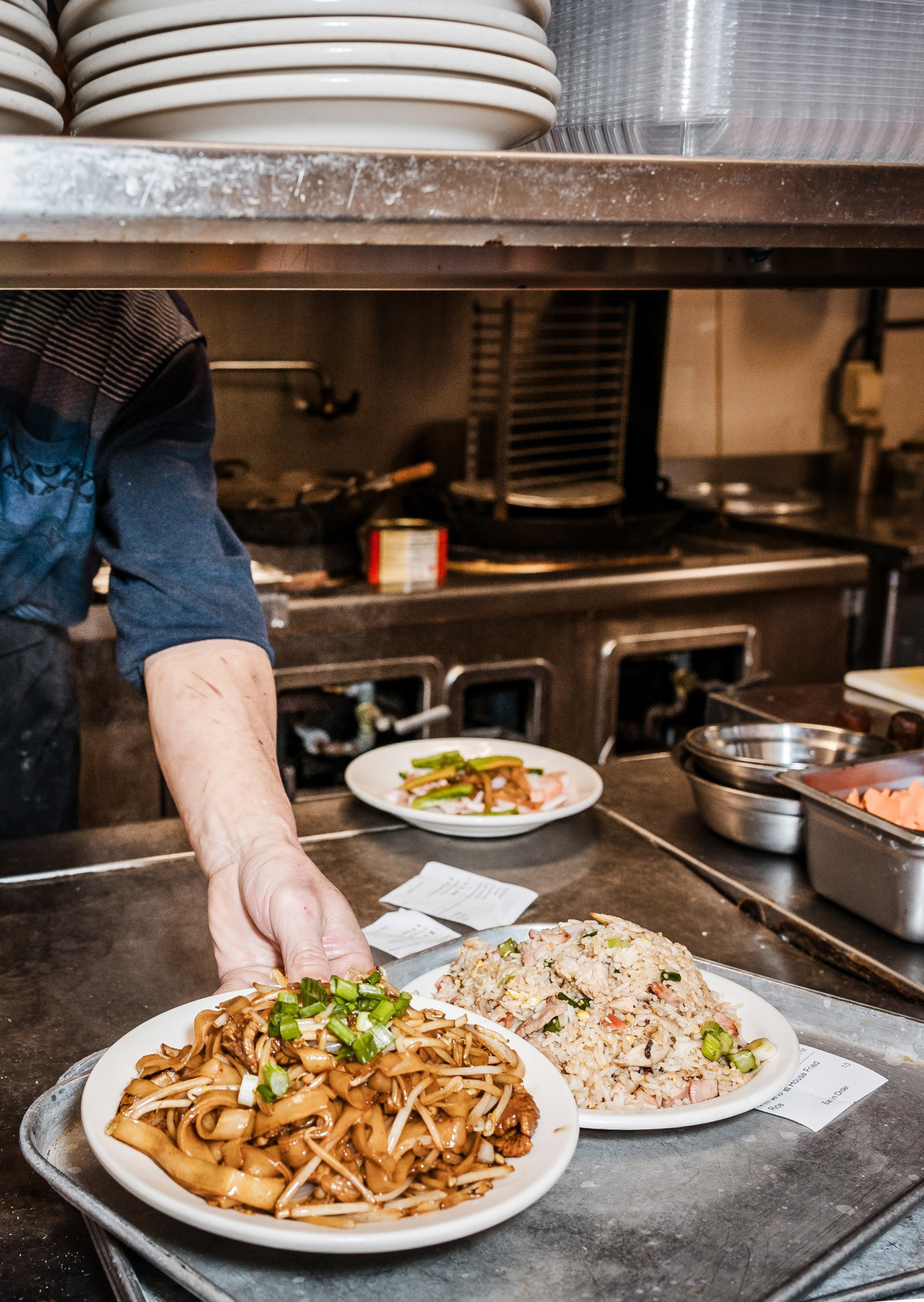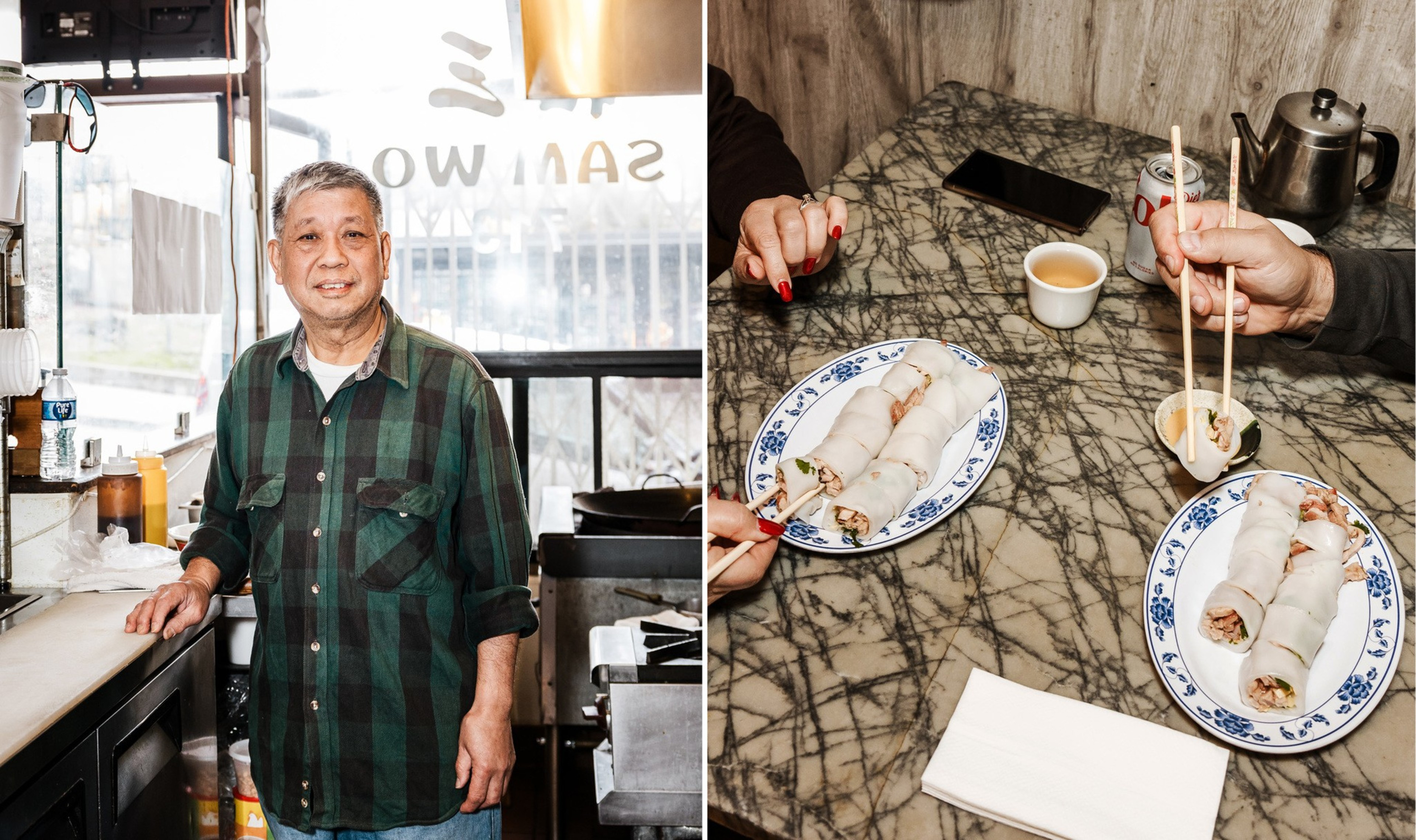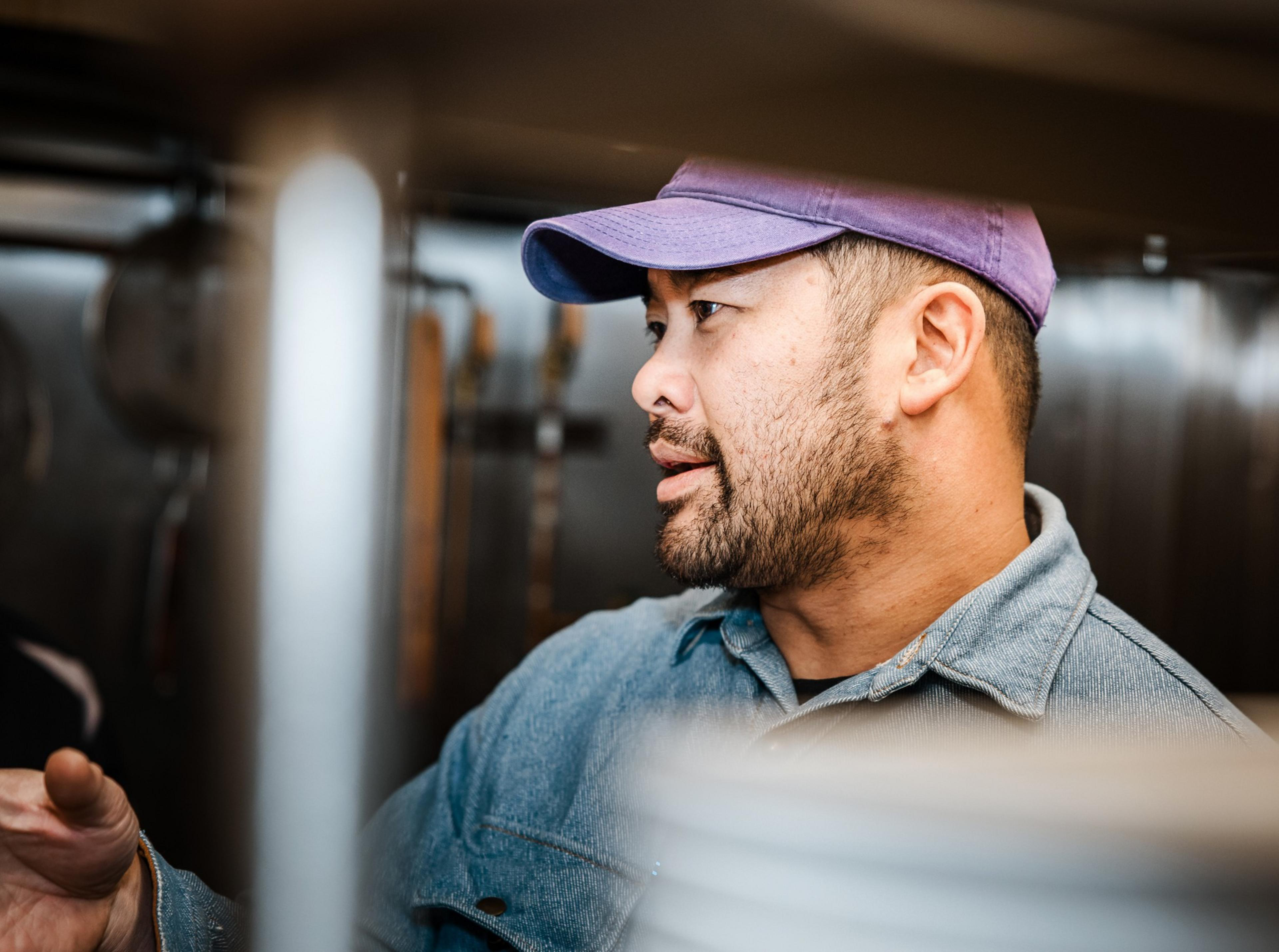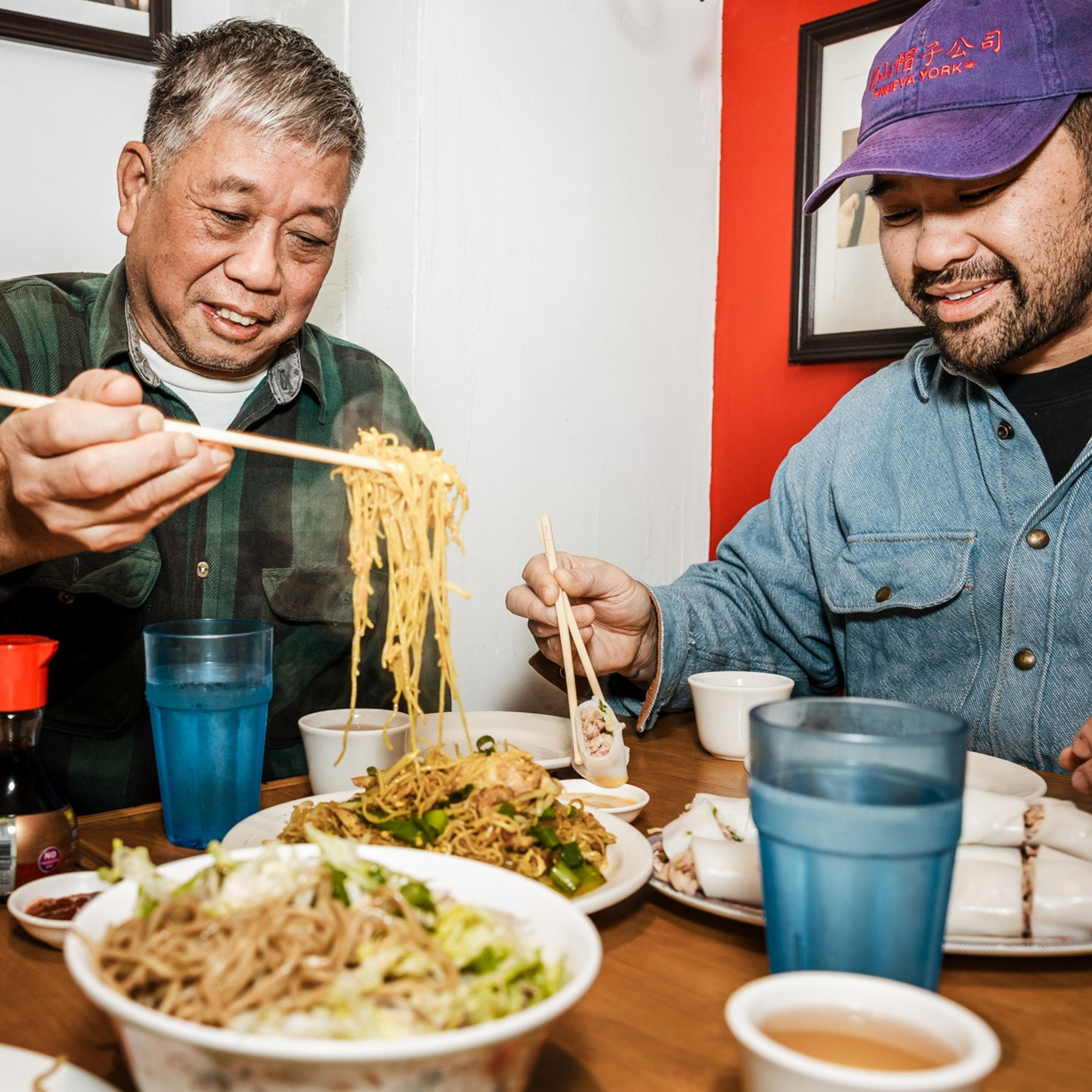On a quiet afternoon in the windowless, fluorescent-lit bowels of Sam Wo’s prep kitchen, Chinatown chefs David Ho and Brandon Jew — each iconic in his own right — are nerding out over a steamer that has produced countless sheets of rice noodles for the restaurant’s famous barbecue pork noodle rolls over its 117 years. The funky jerryrigged contraption is more than a piece of cooking equipment; it is symbolic of Sam Wo’s history and perseverance.
Knowing that the steamer may be retired if the restaurant closes at the end of January when its lease expires, Jew — who has earned a Michelin star for his restaurant Mister Jiu’s (opens in new tab) — observes Ho’s demo of his signature dish at Sam Wo with respect. Is he witnessing a secret? Ho, speaking through his son Jason as a translator, assures him: “There are no secrets.” Well, there is one, actually, and it’s called ingenuity. “You get how resourceful this generation of cooks is,” Jew says.
It’s worth noting that Sam Wo’s pending closure could be another false alarm. The legacy of the restaurant, built as part Chinatown’s recovery after the 1906 earthquake, has been a topic of lament since 2013, when it had to shut down its original Washington Street location before it was “saved” by a group of investors and reborn two years later on Clay Street. “The amount of outpouring was kind of mindblowing for us,” Ho’s daughter Julie recalls.
For the past year, however, the institution has been threatening to close for good. Legions of sentimental diners have taken to Reddit (opens in new tab) to wax on about the establishment’s colorful lore: celebrity diners like Jack Kerouac, who apparently learned to use chopsticks there; a waiter so infamously rude he garnered his own Wikipedia page (opens in new tab); and booze-sopping food like curry-laden Singapore-style stir-fried noodles and beef stew wonton soup served till 3 a.m., the pre-Covid closing time. @Captain_Vegetable writes: “Oh man, late night Sam Wo chow fun has saved me from many a hangover. The first time I went the waitress thought I was somebody else and punched me. Good times.”
Whether Sam Wo stays open is uncertain. But Ho, who has been the owner, the chef, and the lifeblood of the restaurant for almost 40 years, since he took over from his grandfather, will definitely be hanging up his apron — and if he doesn’t, his daughter Julie will do it for him.


This spring, Julie, who started working at Sam Wo when she was 9, survived a major heart attack. “I know we’ve talked about it before, but this time around, it’s legitimate,” insists Julie, who works as a nurse and is propelling her dad’s retirement. “You don’t know what life brings tomorrow.”
Down in the kitchen, Jew and Ho are communicating predominantly in chef-speak. Jew, who opened Mister Jiu’s in 2015 just a couple blocks away, grew up in the Richmond. A third-generation Chinese American, he doesn’t speak Mandarin or Cantonese. Growing up, he shopped in Chinatown with his grandmother, who lived on the edge of the neighborhood. As a teenager, he went there for (of course) illegal fireworks.
Ho, who has lived in Chinatown for more than 40 years, doesn’t speak English. Nevertheless, over the kitchen’s audio mix — the thrum of the exhaust, the snip-snip of green beans being trimmed, the thwack of a cleaver to a cutting board — the two bond over the equipment like a couple of gearheads to Jew’s clear delight.

Gesturing to an ancient motorized grinder that looks like it was pulled from a shipwreck, Ho explains his process for rice noodles: He makes a paste of glutinous rice ground with water, which is spread onto thin, round pans that slide into a multi-runged rack propped up in a wok full of boiling water. Above, attached to a pulley, is an old, dented, upside-down stock pot with a few holes crudely drilled into it, which he lowers over the pans so the noodles can steam. Once the noodles are done, he fills each round with shredded barbecue pork roasted on-site, plus a julienne of pale-yellow cooked egg (“not a speck of brown on it,” Jew marvels) and cilantro, and rolls it up with a quick flick so that it adheres to itself. Ho slices it, and it’s ready to serve with a dipping sauce of hot mustard.
Jew, who proudly considers his fine-dining menu to be Chinese American — and Mister Jiu’s to be one of the growing number of “hyphenate” restaurants in the U.S. — knows he’s witnessing the end of a style of cooking that has provided much more than nostalgia or a hangover cure. If Mister Jiu’s represents a third generation of Chinese American food, then “Sam Wo represents the first,” Jew says. “It’s from the same era of chop suey and egg fu young. This kind of food, which is going away, connects the dots of history a lot better than a story.”
Not surprisingly, history takes work. The rice rolls are the kind of laborious dish that represents what the Ho family sees as part of the problem. So far, the search for dad’s predecessor has been fruitless in part because no one wants to do things the old-fashioned way. “How we cook at Sam Wo, it’s very old-school and time-consuming,” says Julie, who seems open to modernizing things. “Sometimes I wish there could be a machine to make this — just press some buttons like at Krispy Kreme.”

Steven Lee, one of two who joined Ho as primary partners in Sam Wo when the restaurant needed financial help, looks at it as a brand. He’s hopeful he can keep its legend alive. He’s talking about CPG (opens in new tab)s, maybe a cookbook, or something at the airport. Watching the two chefs confer, Lee says, “It’s time for a new generation to take over,” looking at Jew pointedly. “We need more people like you.”
Since opening Mister Jiu’s in the historic Four Seas location — making way for 2024’s smash hit Four Kings — Jew has been embraced with open arms by many but has also faced scrutiny (opens in new tab) for gentrifying the neighborhood along with upscale Chinese restaurants Eight Tables (opens in new tab) and Empress by Boon (opens in new tab). “Chinatown has so many layers. I always felt like I was one layer away from where I wanted to be,” he says. Eight years into his time there, he’s starting to be accepted, and taking over Sam Wo would anchor him in the community.
But right now, he’s maxed out. He has a new baby girl and a nationally renowned restaurant to run. “If my hands weren’t so full … ” he says remorsefully, the romance of the idea clearly hard to turn down. As a compromise, Jew suggests to Lee that, should Sam Wo close, he could put the famous rice rolls on his bar menu at Mister Jiu’s as a tribute. But Lee, all business, warns him that the recipe is trademarked.

Trademarks, however, are missing something intangible. “If you take out the heart of the restaurant, what’s going to be left?” Jew wonders about Ho’s retirement. Having a restaurant’s success rest on one chef and owner is a burden he’d like to solve himself. “I think about it all the time. But then, I don’t have intentions for Mister Jiu’s to stay open for 100 years. It’s OK if it ends.”
At 45, Jew is in the prime of his career. On the brink of 70, Ho is in a very different place. “It’s very bittersweet, because I grew up at the restaurant,” says Julie, who lives in Daly City. “It was our anchor. I feel like I’m still a part of Chinatown because of it. But I have hope for my dad to be a person and not just a restaurant person,” she says, envisioning a trip to Hawaii and more time with the grandkids. “My dad has always been Sam Wo.”

